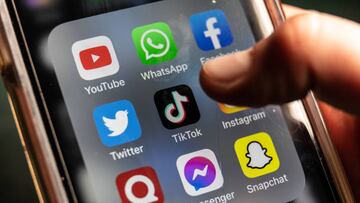What needs to happen for Biden not to ban TikTok in the US?
TikTok lovers anxiously awaits word from the White House on if they plan to ban the beloved app owned by ByteDance. What could avoid the ban?


Millions of TikTok users could see the app wiped from their devices if the US federal government opts for a full ban —an action that is shares bipartisan support on Capitol Hill.
The Trump administration also took a confrontational stance towards’s Byte Dance, the parent company of TikTok. The company was attacked for its alleged connections to the Chinese Communist Party. The White House raised concerns over the possibility that government officials in Beijing could access user data.
In 2020, when then Presidnet Trump did enact a ban, it was blocked by federal courts. TikTok has made it clear that any attempt to ban the platform would be met with legal action.
Read more from AS USA:
What is President Biden asking Byte Dance to do?
The White House has said that unless Byte Dance sells TikTok, the application risks being banned. No specific timeline has been made available.
In June 2022, TikTok US announced that it had reached an agreement with Oracle, the cloud and software giant, to store “100% of US user traffic.”
“We still use our US and Singapore data centers for backup, but as we continue our work we expect to delete US users’ private data from our own data centers and fully pivot to Oracle cloud servers located in the US,” said TikTok after user information had been transferred to the Oracle Cloud Infrastructure. TikTok also said that they were giving Oracle the power to audit the social media app’s “data management protocols,” to provide “users even more peace of mind.”
However, recent developments indicate that federal officials and lawmakers are not satisfied with this arrangement and would like to see all of TikTok divested from Byte Dance. TikTok has over a hundred million active users in the United States, and the response is hard to predict. Would users feel protected? Would they raise concerns over the use and access to their data? Would they be angry and see it as an overreaction? Whether the reaction would change the mind of leaders in Washington seems unlikely.
Why is the United States taking such a strong stance against TikTok now?
The escalation in the position taken by the US government on Byte Dance and TikTok mirrors the increasingly hawkish approach to diplomacy the country’s leaders have taken with the PRC over the last year.
The US government has voiced disappointment that Beijing did not join the US and the European Union in imposing sanctions on Russia after the invasion of Ukraine.
Subsequently, then Speaker of the House Nancy Pelosi visited Taiwan and affirmed the US’ military promise to protect Taiwan in the event the PRC attacked the island. This was interpreted by China’s Ministry of Foreign Affairs as a violation of the promise to abide by the “one China policy,” a precondition for the establishment of diplomatic relations with the PRC.
Then came the balloon saga in early February.
And earlier this month, leaders in Washington responded with concern about the status of the US in the Middle East after China’s support in negotiating a deal between Iran and Saudi Arabia to reestablish diplomatic relations.
Ned Price, the spokesperson for the State Department, said earlier this week that “some allege” that the “role” of the United States is being “supplanted” by China. Price went on to say, in a tone that left doubts that he believed his own words, that he “had a difficult time wrapping [his] head around how [the US’] role could be supplanted when no country on earth has more to help build a more stable more integrated region.”
Afghanistan. Iraq. Syria. Libya. Yemen. In two decades, this region has been scarred by foreign intervention, civil conflict, religious extreamism, sites of horror like Abu Ghraib, and proxy wars. The US was involved in all.
"No country on Earth has done more to build a more stable, more integrated [Middle East]."
— MintPress News (@MintPressNews) March 14, 2023
State Dep't Spox Ned Price on the US role in the region when asked about China mediating the renewal of diplomatic relations between Iran and Saudi Arabia. pic.twitter.com/fN5cIryTUR
Related stories
The United States and China are very dependent on each other economically. Officials from both countries understand this reality, and it seems that those in Washington are hoping to undermine Beijing through any means they can... that won’t lead to widespread backlash at home. Backlash from, say, higher prices because the government imposed a tarrif on certain Chinese goods. Banning TikTok is one way to send a blow to China that, while symbolic, does not pack a very heavy punch. In the short term it would be a huge loss of revanue, and sadly many of TikTok’s employees would lose their jobs, but that would be unlikely to trigger a strong response from the public. The company is thought to have around 10,000 employees, the same amount that have been fired by other major tech companies this year. Meta, the parent company of Facebook, announced 10,000 additional layoffs earlier this week.
Also, China cannot respond easily with a proportional measure because most US-based social media companies are not allowed in the country. Facebook, Instagram, and Twitter, YouTube, Reddit, and even Pintrist, are all banned in the PRC.

